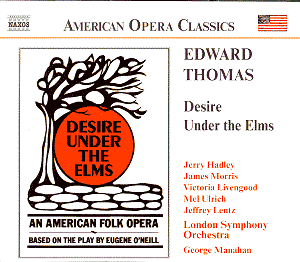The sixty page booklet is in English including
everything you could wish. There is an introduction from the composer,
a critique of the work, Tom Z. Shepard's account of the crooked
road that led to the release of this set (yes that is the
very same Shepard who steered CBS in its glory days), plot synopsis,
composer and artist profiles. The synopsis and Shepard's article
are also in German and French.
Thomas studied with Tibor Serly (he who completed
the Bartok viola concerto). He is a multi-faceted composer active
in shows, popular, commercial, jazz and song. His Clarinet Concerto
has been performed by Sidney Fell and Stanley Drucker. Images
for oboe and chamber orchestra was premiered in Oklahoma.
Whimsey for chamber orchestra was premiered in San Jose
and then given by the Westchester Symphony conducted by Paul Dunkel
(who years ago recorded the Eliot Carter Symphony and Pocahontas
Suite). There are various Thomas musicals: Six Wives on
the subject of Henry VIII's life and loves, Searching 4Y and
Mata Hari (written with Martin Charnin) later retitled
Ballad of a Firing Squad. He has won seven gold records
as composer arranger for Vic Damone. Roberta Peters, Leontyne
Price, Julie Andrews, Jack Jones and the Vienna Boys Choir.
Three brothers work the farm. The farm is owned
by their flinty and avaricious father Ephraim Cabot. The brothers
are Eben and his two half-brothers, Simeon and Peter who dream
of escaping the interminable drudgery of the farm for California
and dreams of gold. Eben persuades Simeon and Peter to sign away
their stake in the farm in return for gold he has stolen from
Ephraim's store and they set off for California. Ephraim returns
from a long absence and with a wife, Abbie, in tow. Ephraim has
no sense of passing on his farm to anyone not even to Abbie. Abbie
and Eben drift together with Abbie making the running. In Act
III Abbie bears a child rumoured to be Eben's. The inevitable
fight between Eben and Ephraim follows and Eben is beaten. Eben
defeated tells of Abbie's plot to take over the farm and vows
to follow his brothers to California. Abbie distraught with her
affections severed in all directions sings over her baby. With
Eben packing to leave Abbie appears and announces that she has
killed their son. Eben goes off to the sheriff. Ephraim reappears
and when he hears from Abbie that the child was in fact Eben's
he tries to unsuccessfully to strangle her. Eben returns and tells
Abbie that while he was telling the Sheriff he realised how deeply
he loved and how they should now escape together - although they
do not do so. Guilt-ridden, Abbie insists that she must suffer
for her sin. The sheriff arrives and when he arrests Abbie, Eben
announces that he planned the killing with her. The two are lead
away by the sheriff leaving Ephraim in lonely Old Testament isolation,
possessing and possessed by the land.
Masteroff furnishes a libretto that is apt to
Thomas's music. And what of the music? Thomas is a traditionalist.
From the sub-title 'folk-opera' you can accurately conclude that
the idiom is pastoral Mid-West. The referential points are most
clearly Copland's The Tender Land (best heard in Bernstein's
Sony extracts), Vaughan Williams' Sir John in Love and
the rich verismo romanticism of Daniel Catán (try his opera
Florencia en el Amazonas) and the semi-operatic works of
Stephen Sondheim (notably Sweeney Todd and A Little
Night Music). The writing is luminous, lyrically intense,
redolent of pastoral scenes but with a perfervid psychological
subtext of envy, jealousy and lust. It is usually transparently
orchestrated for a very full orchestra. The scenes are through
composed without pauses. There are three acts including eight
scenes in total with one track for each scene. The music darkens
and so do the voices to tragic colours as the child killing and
self-sacrificial dénouement is reached in the last two
scenes of Act III.
The 'morality' of the piece reflects the sort
of predatory possessive capitalism and avarice that grips the
two farmers in Delius's A Village Romeo and Juliet.
Instead of the children escaping the values of the farm the main
protagonists wallow in the commercial venality of their motives.
The land stands in idolatrous sway over the father's affections.
The land is always 'mine' - hardly 'ours' even just after marrying
Abbie.
These very emotive themes, human values, flawed
character traits are of course the currency of opera from Verdi,
through Puccini and Zemlinsky, Schoeck and Schreker through Bartok
and Shostakovich.
This is a modern opera that is not at all hard
going musically speaking although its grip is in narrative continuum
rather than in lyrical eminences. This is not a construct of ordinary
linkages between set-piece scenas although Eben's imploring exaltation
in the final scene certainly registers memorably.
There is a real black frisson as the Sheriff
turns and admires the farm: 'It's a Jim Dandy farm .... wish I
owned it!'. Thunderous dead impacts from the orchestra leave the
audience with little hope and no soft sunset of an ending. This
is more Tess of the d'Urbervilles than Happy-ever-after.
I see that this double width box set is termed
'American Opera Classics'. We can look forward to other instalments,
the next being of Barber's Vanessa. Is it too much to hope
that they will record Ginastera's controversial Bomarzo,
Sessions' Montezuma and a new recording of Hanson's Merry
Mount?
Human foibles, tragedy and sin are reflected
unflinchingly in Thomas's knowingly pastoral-verismo score. Not
a naive bone in its body.
Rob Barnett
